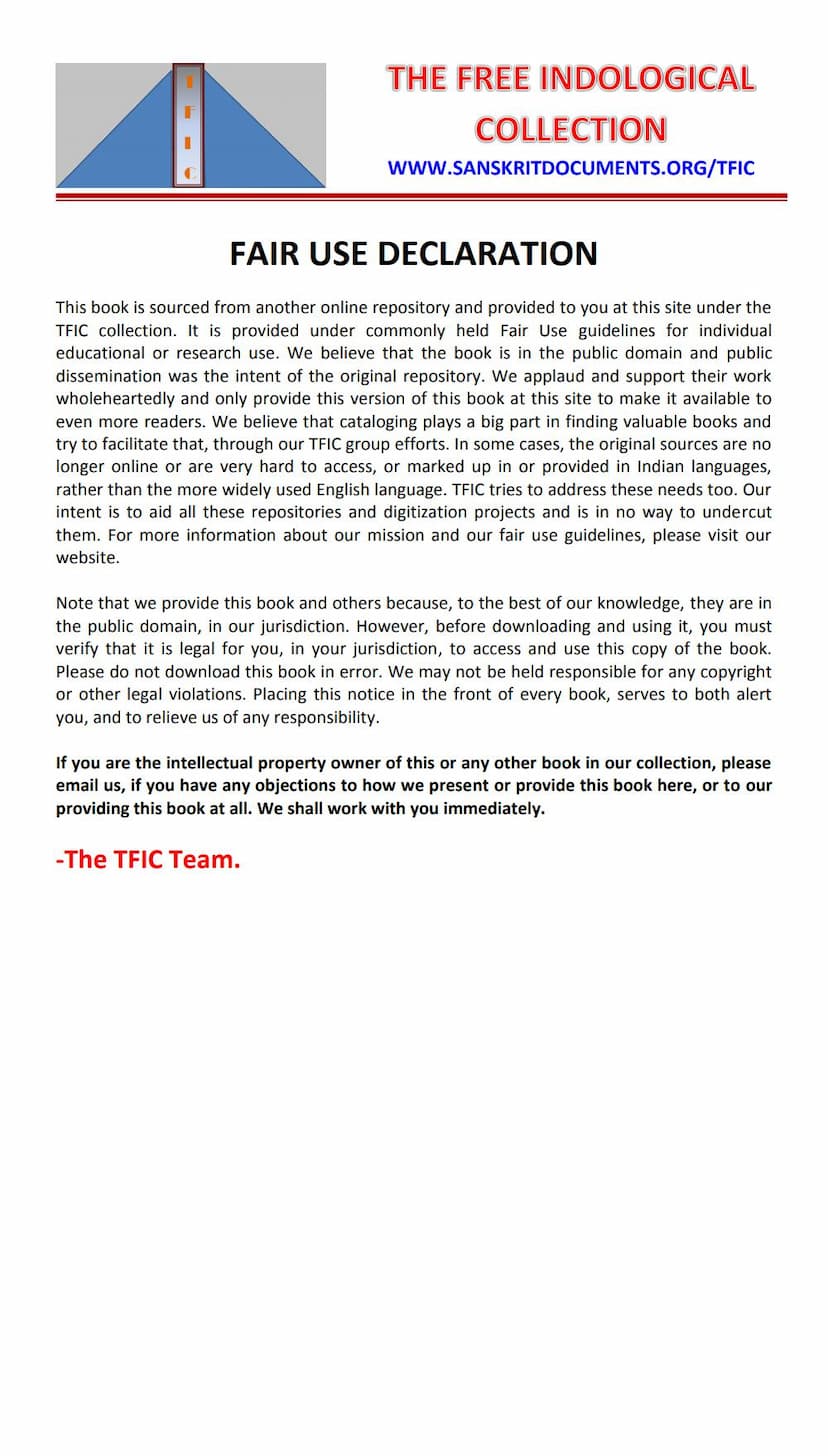Jayantika
Added to library: September 2, 2025

Summary
Based on the provided text, here is a comprehensive summary of the Jain text "Jayantika" by Bakulbhushan Mahakavi:
"Jayantika," authored by Bakulbhushan Mahakavi and published with financial assistance from the Ministry of Human Resource Development, Government of India, is a prose romance in Sanskrit. The text highlights the profound literary contributions of the poet, who is praised for his exceptional skill in composing poetry in various forms, including dramas, mahakavyas, prose romances, and stotras.
The book is structured into five "laharis" or sections, each detailing different stages of a complex and intertwined narrative. The preface and foreword, written by esteemed scholars, emphasize the poet's mastery of the Sanskrit language, his ability to continue the grand tradition of Sanskrit poetry into the 20th century, and the unique blend of scholasticism and aesthetic appeal in his works.
Summary of the Narrative Across the Five Laharis:
The story revolves around the lives and reincarnations of several characters, driven by destiny, divine intervention, and human actions. The central figures are Charuvaktra and Saugandhini, who later are reborn as Jivasena and Jayantika.
First Lahari:
- Introduces the city of Aribhikara and its virtuous king, Jivasena.
- Jivasena's son, Charuvaktra, is the protagonist. His father, Vimatakesari, was killed by his friend Vrishaskandha, who harbored ill intentions towards Charuvaktra's mother, Varamalini.
- To protect herself and her son, Varamalini flees to the forest with Charuvaktra.
- Charuvaktra undertakes severe penance to gain strength to avenge his father and reclaim his kingdom.
- The narrative includes divine interventions, with gods like Indra, Siva, and Brahma showing interest in Charuvaktra's fate.
- Charuvaktra successfully defeats Vrishaskandha, reclaims his kingdom, and is coronated.
Second Lahari:
- The story takes a turn when Charuvaktra, during a hunting expedition, accidentally wounds a maiden named Saugandhini.
- Saugandhini, who was brought up by Dhamana and later Dirghasatra, recognizes Charuvaktra. She reveals her lineage as the daughter of King Sugandhana of Madhura.
- In a tragic turn, Saugandhini dies from her wound. Charuvaktra, overcome with grief, also dies.
- Indra intervenes, revives both Charuvaktra and Saugandhini, but they are reborn as children.
Third Lahari:
- The narrative shifts to the reborn children: Jivasena (Charuvaktra) and Jayantika (Saugandhini).
- Jayantika falls in love with Jivasena after seeing his picture. Jivasena reciprocates and seeks her out.
- Jayantika's life is fraught with challenges. She encounters a Tapasi who was originally Sukesha, cursed to become a woman.
- Jayantika eventually bears a son who gets lost in the forest.
- The Tapasi (Sukesha) gives Jayantika a magical gem-studded garland, enabling her to assume the form of Sukesha and become the king of Chitrapura.
- This section is filled with supernatural elements and the transformation of characters.
Fourth Lahari:
- Jayantika, now in the form of Sukesha, searches for her lost son and husband. She loses the magical garland.
- She and the Tapasi (Sukesha) embark on a journey, encountering various divine and mythological figures, including Brahma, Shiva, Vishnu, and their celestial abodes.
- The narrative extensively describes the philosophical and spiritual aspects of Jainism and Hinduism through the poet's extensive knowledge and creative expression.
- The story progresses through complex plots involving divine boons, curses, and the unfolding of destiny.
Fifth Lahari:
- The story returns to Jayantika, who, in her human form, is searching for her son and husband.
- She encounters a hunter who is revealed to be the cursed Sukesha.
- A dramatic encounter unfolds involving supernatural elements. Jayantika, her son Jivasena (now identified as Jivasena), and the hunter (Sukesha) are involved in a chaotic series of events.
- Ultimately, after numerous trials and tribulations, including the loss and revival of characters, the story culminates in a happy reunion.
- Jivasena is crowned king of Vaijayanti, and his son Virasena is placed on the throne of Hemapura, bringing closure to the narrative.
Overall Themes and Significance: "Jayantika" is lauded for its:
- Exquisite Sanskrit Prose: The style is compared to the classics, with rich descriptions, elaborate adjectives, and intricate sentence structures.
- Mythological and Philosophical Depth: The poem weaves in profound philosophical concepts and mythological narratives, demonstrating the author's erudition.
- Emotional Range: The work evokes various emotions, from heroism and wonder to pathos and love.
- Moral and Ethical Instruction: Beyond its aesthetic appeal, the story imparts lessons on dharma, karma, and the journey of life.
- Unique Narrative Structure: The interweaving of past lives, divine interventions, and the cyclical nature of birth and rebirth contributes to its complexity and appeal.
The book is a testament to Bakulbhushan Mahakavi's genius and his significant contribution to modern Sanskrit literature.